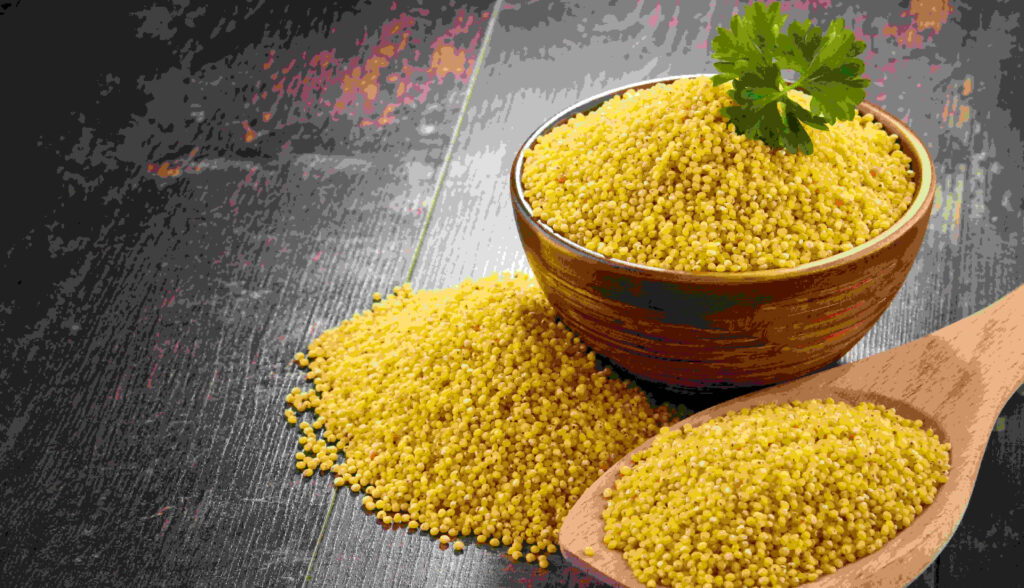Proso millet, also referred to as broomcorn millet or white millet is an ancient grain that has been cultivated for thousands of years and valued for its nutritional benefits.
Also known as chena or barri in Hindi, cheena in Punjabi and varigelu in Telugu, proso millet is a gluten-free grain that belongs to the Poaceae family, which includes other cereal grains like wheat, rice, and corn.
Although it is less commonly consumed compared to other grains like rice or wheat, proso millet boasts an impressive nutritional profile and offers a wide range of health benefits.
In this blog, we’ll explore the proso millet benefits for health, its nutritional value and why you should consider incorporating it into your diet.
What is Proso Millet?
Proso millet, scientifically known as Panicum miliaceum, is characterized by its small, round, yellow or white grains, which have a mild, slightly nutty flavor and a light, fluffy texture when cooked. It is highly versatile and can be used in a wide range of culinary applications, including as a whole grain, flour, or meal.
Originally domesticated in East Asia, proso millet has been an important staple food in many cultures around the world, particularly in regions with arid or semi-arid climates where it thrives in poor soil conditions and requires minimal water.
Today, proso millet is cultivated in various countries, including China, India, Russia, the United States, and parts of Europe.
Nutritional Value
Here is the approximate nutritional value of 100 grams of proso millet (2, 3):
- Calories: 341 kcal
- Proteins: 12.5 g
- Carbohydrates: 70 g
- Fiber: 3 g
- Iron: 3.8 mg (21% Daily Value (DV))
- Zinc: 1.7 mg (15% DV)
- Phosphorus: 277 mg (22% DV)
- Calcium: 14 mg (1% DV)
- Thiamine: 0.4 mg (33% DV)
- Niacin: 4.6 mg (29% DV)
- Riboflavin: 0.28 mg (22% DV)
Proso millet also contains potassium, magnesium and folic acid.
Health Benefits
Here are the proso millet benefits for health.
1. Rich in Antioxidants
Proso millet is rich in antioxidants, which are compounds that help protect the body from oxidative stress by neutralizing free radicals.
These antioxidants include carotenoids, phenolic acids and flavonoids, which contribute to the millet’s health benefits, such as reducing inflammation, supporting cardiovascular health, and potentially lowering the risk of chronic diseases.
The phenolic acids in proso millet include ferulic acid, p-coumaric acid, vanillic acid, isoferulic acid, 4-hydroxybenzoic acid and p-hydroxycinnamic acid. And other phenolic acids include chlorogenic acid, syringic acid and caffeic acid, which may have positive effects on human health.
The flavonoids found in proso millet were vitexin and isoferulic acid, methyl hydroxycinnamate and methyl ferulate in the studies on millets.
And some varities of proso millet were found to be rich in carotenoids like lutein and zeaxanthin, while some other varieties were found to be lower in these carotenoids.
Including proso millet in your meals not only provides essential nutrients but also adds a layer of protection against oxidative stress, supporting long-term health.
2. A Good Source of Plant-based Protein
Proso millet is a good source of protein, making it a valuable addition to a balanced diet, especially for those seeking plant-based protein options.
With about 13 grams of protein per 100 grams, proso millet supports muscle repair, immune function, and overall health.
Proso millet provides all the essential amino acids like leucine, isoleucine, methionine. Like most plant-based proteins, it is slightly lower in lysine and threonine, but can be balanced by combining it with other protein sources like legumes.
Including proso millet in your meals not only boosts your protein intake but also offers a rich array of other nutrients like fiber, vitamins, and minerals.
This makes it particularly beneficial for vegetarians, vegans, and anyone looking to diversify their protein sources beyond the usual grains.
3. Gluten-Free
One of the most prominent benefits of proso millet is that it is naturally gluten-free, making it an excellent grain option for those with gluten sensitivities or celiac disease.
Unlike wheat, barley, and rye, which contain gluten proteins that can trigger adverse reactions in sensitive individuals, proso millet provides a safe alternative.
They are packed with essential nutrients like fiber, protein, and antioxidants, offering numerous health benefits without the digestive issues associated with gluten.
Incorporating proso millet into a gluten-free diet can enhance nutritional diversity while maintaining digestive health.
Whether used in porridges, salads, or baked goods, proso millet adds a nutritious and versatile element to meals, ensuring that individuals who need to avoid gluten still have access to wholesome, grain-based options.

4. Beneficial for Cardiovascular Health
Millets including proso millets are rich in fiber, protein, antioxidants and complex carbohydrates, which can be valuable in preventing cardiovascular diseases.
Studies suggest that Proso millet consumption may reduce high blood pressure and high cholesterol levels, both of which are the primary risk factors of heart disease.
Animal studies suggest that feeding rats the proso millet protein could increase plasma levels of HDL (high-density lipoprotein) – the ‘good’ cholesterol.
Additionally, regular consumption of millets has been found to reduce high blood pressure and high cholesterol levels in post menopausal women suffering from signs of cardiovascular diseases.
Moreover, the magnesium content in proso millet also supports heart health by helping maintain normal blood pressure levels and reducing the risk of hypertension and stroke.
5. May Promote Healthy Gut
Proso millet is also beneficial for digestive health due to its high fiber content, which promotes regular bowel movements and prevents constipation.
The fiber also helps maintain a healthy gut by supporting the growth of beneficial bacteria, contributing to better digestion and nutrient absorption.
Proso millet contains resistant starch, a type of starch that isn’t digested in the small intestine but instead moves to the large intestine, where it ferments.
Diet rich in resistant starch or protein provides an energy source for gut microbiota, which can potentially treat inflammatory bowel disease (IBD).
Proso millet is also gluten-free, making it a good option for those with gluten sensitivities or celiac disease.
Additionally, its easily digestible nature soothes the stomach and can help manage digestive issues like bloating and indigestion, making it a gentle yet effective choice for overall digestive wellness.
6. May Support Nerve Function
All the millets, including proso millets are a great source of lecithin. Lecithin is a type of phospholipid that is important for maintaining healthy cell membranes, including those in nerve cells.
Lecithin supports nerve cell function by restoring nerve cell function, rebuilding myelin fiber (the protective covering around nerves), and boost brain cell activity.
Proso millets are also rich in B-complex vitamina like niacin, Vitamin B6, and folate, which may play an essential role in nerve health.
Vitamin B6 plays a crucial role in cognitive function through the biosynthesis of neurotransmitters (the chemical messengers that transmit signals between nerve cells in the brain and throughout the nervous system).
Regular consumption of proso millet can thus contribute to a healthier nervous system, enhancing cognitive function and overall mental well-being.

7. May Control Blood Sugar Levels
Proso millet has a glycemic index of 50-65, which is moderate-low, means it does not cause a rapid spike in blood sugar levels after consumption.
This makes it a suitable option for individuals with diabetes or those looking to manage blood sugar levels more effectively.
Proso millets are a good source of complex carbohydrates including amylose and resistant starch.
These starches are resistant to digestion, meaning they get digested more slowly compared to other types of starch. This slower digestion can lead to a more gradual release of glucose into the bloodstream, which can help in maintaining stable blood sugar levels.
Millets including proso millets are a good source of magnesium, which helps in controlling blood sugar levels by supporting important enzyme activities in the body.
Magnesium can also reduce the frequency of headaches and heart attacks, making proso millets a valuable addition to the diets of people who are suffering from heart related ailments associated with diabetes.
An animal study suggests that proso millet can improve blood sugar and insulin levels in genetically obese type 2 diabetic mice, even when they consume a high-fat diet.
The fiber and protein in proso millet also help slow down the absorption of sugar into the bloodstream, preventing sudden fluctuations in blood sugar levels.
However, more research on humans is needed to find the effect of proso millets on blood glucose levels.
8. May Help in Strengthening Bones
Proso millet contains essential minerals like calcium, magnesium, and phosphorus, which are important for maintaining strong and healthy bones.
These minerals may help support bone density, prevent osteoporosis, and reduce the risk of fractures and bone-related disorders, particularly in older adults.
How to Incorporate Proso Millet into Your Diet
Incorporating proso millet into your diet is easy and versatile. Here are some simple ways to include this nutritious grain in your meals:
- Breakfast: Cook proso millet as a porridge with milk or water. Add fruits, nuts, and a drizzle of honey for a healthy start to your day.
- Salads: Use cooked proso millet as a base for salads. Combine it with fresh vegetables, herbs, and a light vinaigrette for a nutritious, satisfying meal.
- Soups: Add proso millet to soups and stews for added texture and nutrition.
- Baking: Use proso millet flour in baking recipes as a gluten-free alternative to wheat flour. It can be used in muffins, bread, and pancakes.
- Side Dishes: Serve proso millet as a side dish, similar to how you would use rice or quinoa. It pairs well with a variety of proteins and vegetables.
How to Store Proso Millet
- To store proso millet for longer shelf life, keep it in an airtight container in a cool, dry place away from direct sunlight.
- For even longer storage, you can refrigerate or freeze it to prevent moisture and pest contamination.
- If storing in bulk, ensure the millet is completely dry before sealing.
- Proper storage can extend its freshness for up to 6 months at room temperature, or up to a year when refrigerated or frozen.
- Before storing, carefully inspect the proso millet for any signs of pests or contamination, and remove them to maintain the quality of the grain for the longer period.
In Closing
Proso millet is an ancient, nutrient-rich grain that offers a wide range of potential health benefits. These include supporting heart health, aiding in weight management, regulating blood sugar levels, strengthening bones, and promoting better digestion.
However, most of these benefits are attributed to the broader millet family and its nutritional profile, as research specifically focused on proso millet is still limited. This highlights the need for more targeted studies to fully understand its unique health advantages.
Thanks to its gluten-free nature, low glycemic index, and versatility in cooking, proso millet makes a smart addition to a balanced diet.
Whether you’re aiming to boost your overall health, manage a specific condition, or simply explore new nutritious foods, proso millet is a wholesome grain worth adding to your meals.
You may also check out
Top 10 Mosambi Fruit Benefits
6 Amazing Benefits of Rose Water on Face



